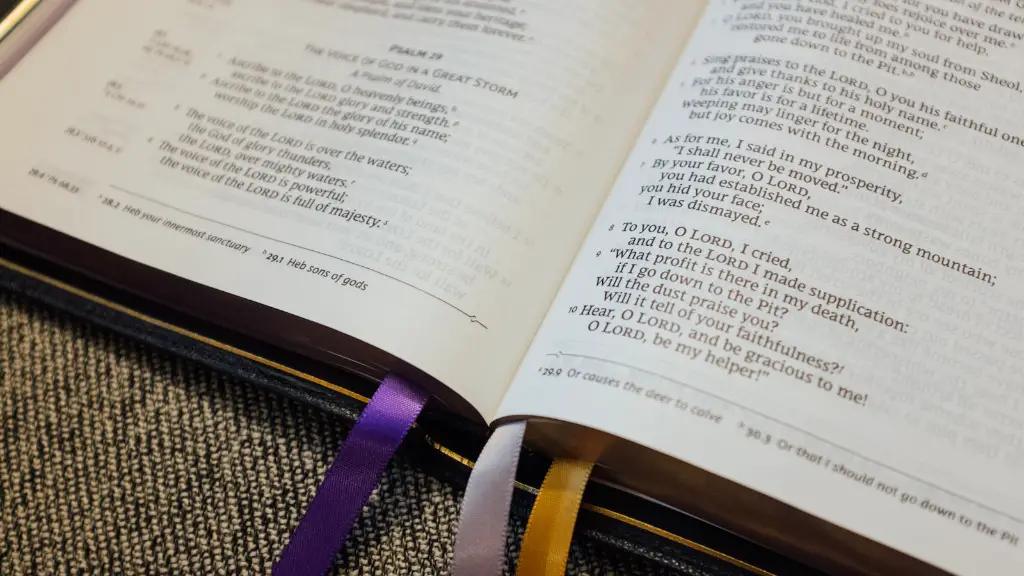Performing a Baptism According to the Bible
The Bible is the foundational source of Christian faith and practice, and although Baptism is one of the most ancient forms of Christian ritual, its interpretation and form can vary across denominations. According to the Bible, Baptism helps to bring believers into the covenant with The Father, The Son, and The Holy Spirit and to mark them as followers of Jesus Christ. Here, we will provide an overview of the theological meaning and practical procedure of Baptism and consider the position of the Baptism of infants.
The Christian concept of Baptism has roots in the Jewish tradition and the ancient world. According to the Gospel of Matthew, Jesus commands his disciples to “Go therefore and make disciples of all nations, baptizing them in the name of The Father and of The Son and of The Holy Spirit”. This is known as the Great Commission, and marks the start of Christians going out and preaching the Gospel of Jesus Christ. The early church continued to observe and practice Baptism as an outward sign of faith in Jesus Christ and obedience to his teachings.
The Christian concept of Baptism is split into two main forms – the Believer’s Baptism and the Baptism of infants. Believer’s Baptism is practiced by Protestants, who believe that only individuals who have reached the “age of reason” and have accepted the Christian faith voluntarily should be baptized. The Baptism of infants is practiced by the Catholic, Orthodox and Lutheran Churches, who believe that infants should be baptized to mark their entry into the covenant of The Father, The Son, and The Holy Spirit, as well as a sign of their intention to live according to the teachings of Jesus Christ.
The practical procedure of Baptism starts with a short service of introductory prayers and scripture readings. The candidate for Baptism is asked questions about their faith in Jesus Christ, and promises to follow his teachings. The baptism ritual involves a pronouncement of faith in Jesus Christ and acceptance of his teaching, followed by the priest or pastor sprinkling water on the head of the Christ-follower, and is known as the “rite of initiation”. In more elaborate ceremonies, a full immersion in the water, known as the “rite of Abolition”, is also practiced. The service then ends with prayers of blessing and more readings from the Bible.
It is important to note that although Baptism is seen as a deeply meaningful moment, not all Biblical scholars are in agreement over its function and meaning. For example, some argue that Baptism is required for salvation and for believers to enter the Kingdom of Heaven, while others argue that it is a symbol of commitment and belonging but does not guarantee salvation. As Baptist scholar Thomas Ejercito succinctly states, “Baptism is a physical act that outwardly identifies one’s spiritual commitment to Christ.”
At its core, Baptism can be seen as a symbol of relationship and commitment to Jesus Christ and his teachings. As mentioned above, the specific forms of the ritual and the interpretation of its meaning can vary across denominations and even within denominations. What is clear, though, is that in order to perform Baptism according to the Bible, a person must accept and confess the teachings of Jesus Christ, and enter into a relationship with him.
The Significance Of Baptism According To Different Denominations
Christian denominations across the world have different interpretations of the theological significance of Baptism. For example, in Catholicism and Orthodoxy, Baptism is seen as conferring a ‘mystical regeneration’ and an individual being born again into the family of God. It is seen as a sacrament and a public display of faith, and those baptized are accepted into the particular Church and the people of God.
In the Anglican tradition, Baptism is understood as a voluntary covenant to live according to the teaching of Jesus Christ, and to respond to the Holy Spirit. It is a sacrament that marks acceptance into the Church and initiates a path to faith. It is seen as conferring grace that helps the individual to grow in spiritual maturity as a member of the Christian community.
In the Lutheran tradition, Baptism is understood as conferring God’s grace on an individual which is then nurtured through faith. It is seen as the door to fellowship with the Christian Church, and is considered the foundational event in the Christian life. Baptism is also seen as the gateway to receiving other sacraments, including the Holy Communion.
In Calvinism, Baptism is seen as a sign of unity with Christ and a symbol of a person’s new life in Him. It is seen as a special moment that not only confers favour on an individual but also binds them to the Identity of Christ and His Church. It is also understood as being a means of grace granted to believers through which they can progress towards Godly living.
Infant Baptism According To The Bible
While there is a wide range of interpretation about the theological meaning of Baptism, few would deny its deep significance and power as a symbol and an act of faith. One important aspect of Baptism that has been a source of debate, though, is the Baptism of infants. According to some Protestant denominations, only those who have attained the ‘age of reason’ and are willing to accept the Christian faith should be Baptised. This is in opposition to the Catholic and Orthodox tradition of infant Baptism, which suggests that infants should also be Baptised as an act of introducing them into the covenant with the Christian God.
The idea of infant Baptism is not explicitly mentioned in the Bible, although the Apostle Paul writes that, ‘Children are holy and the promise of God is for them as well’ (1 Corinthians 7:14). Theological opinions differ on this point, but many Christian denominations today still practice infant Baptism as a way of acknowledging an infant as part of the Christian family and as a promise to raise the child as a Christian.
It is important to note, though, that – whatever one’s opinion on the Baptism of infants – the ritual of Baptism should always be the start of a faith-denial journey and a renewal of the baptismal promises, not just a symbolic act. In other words, it is not enough to just ‘go through the motions’, but a person should strive to live a more faithful and authentic Christian life.
The Theological Debate About Baptism
The meaning and purpose of Baptism has been at the root of theological debates for many centuries. Different Christian denominations have different interpretations of the meaning and purpose of Baptism and, in particular, the Baptism of infants. Proponents of infant Baptism argue that it reflects the covenant of God with the Christian community and brings a person into the Church as part of God’s family. Meanwhile, opponents of infant Baptism suggest that a person should be old enough to understand and accept the Christian faith before being Baptised, and hence infant Baptism is unnecessary.
There has been, however, some convergence between the two views in recent decades and more and more denominations are focusing on the importance of faith in Baptism. For example, the Baptist plea for an age of accountability means that Baptism should be done in full acknowledgement of the individual’s faith, even if they are not considered old enough to make a public confession of faith. Hence, while the debate on the Baptism of infants is likely to continue, the focus is increasingly placed on the right age for accepting the Christian faith and making a public confession.
The Link Between Baptism And Confirmation
In many Christian denominations, Baptism is closely linked to Confirmation. That is, after an individual has been Baptised, they are expected to participate in the ritual of Confirmation. Confirmation is a ritual which involves young people publicly affirming their faith in Jesus Christ and their commitment to follow his teachings. In the Catholic and Orthodox traditions, Confirmation is the completion of Baptism.
In the Anglican tradition, the age at which a person is Baptised can vary, but usually the person is older and consecrated to serve the Church. At this point, they are known as Catechumens and their preparation in the Christian faith includes studying and memorising specific passages from the Bible. This is followed by a ceremony where the prepared individual is baptized and confirmed. In the Lutheran tradition, Confirmation is seen as a period of instruction in the faith and at the end of the period, there is a special service where the newly confirmed candidates make publicly renew their baptismal vows.
In the Protestant tradition, Confirmation is an optional ritual which is usually administered to children who are around the age of twelve or thirteen. In this case, the ritual of Confirmation involves a vow of lifelong obedience, after which the candidate is given the laying of hands and a blessing. This is then followed by a special service, often known as the ‘first communion’, where the student affirms his or her profession of faith and is welcomed into the Christian Church.
The Significance Of Baptism As A Public Statement Of Faith
The ritual of Baptism is not just an individual sign of faith but also a public statement to the Christian community. It is a moment to present the belief publicly and receive support from the Christian community. Hence, Christian denominations view Baptism as a moment for reconnecting with God, as well as being a symbol of the unity of the Church. This unity is expressed through the sharing of the love and faith of all those present at the baptism, which is a way of recognizing the importance of belonging to the Christian community and proclaiming the grace of God.
In conclusion, baptism is a deeply meaningful moment for many Christians and can be seen as a symbol of relationship and commitment to Jesus Christ. While the theological interpretation and practical procedure of the ritual can vary across denominations, the common thread is a confession of faith, acceptance of Jesus Christ and entrance into a relationship with Him. It is also important to note that the debate around the Baptism of infants is still ongoing, and that the difference between a symbol and a real faith-denial journey still remains.





